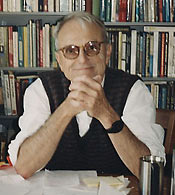UC Berkeley Press Release
English professor Julian C. Boyd dies at 73
BERKELEY – Julian C. Boyd, a University of California, Berkeley, professor emeritus of English and a 1993 winner of UC Berkeley's Distinguished Teaching Award, died of cancer Tuesday (April 5) at his Berkeley home. He was 73.
 Julian C. Boyd (Photo courtesy the Boyd family) |
A native of Bogalusa, a small town on Louisiana's Gulf Coast, Boyd earned a B.A. in English from Williams College in 1952, an M.A. in English in 1954 from the University of Michigan, and a Ph.D. in English language and literature from the University of Michigan in 1965.
He joined UC Berkeley's English Department as a linguist in 1964 and taught thousands of students on campus before, and after, retiring in 1994. Boyd also taught in the 1970s and '80s at the Graduate Theological Union near campus. Shortly before his death, he taught a correspondence course through UC Berkeley Extension.
Boyd developed expertise in the day-to-day use of English and the modal auxiliary "helping" verbs that are used with main verbs to express shades of time and mood, his wife, Melanie Lewis, said. He provided expert testimony and research about the meaning of words in about 40 court cases, including murder trials, and wrote numerous articles about language and meaning.
In an introduction Boyd prepared for a UC Extension course on the English language, he noted that his first teaching job was teaching English as a second language to early Peace Corps volunteers.
Lewis said that Boyd developed a love of language and literature as a boy, and devoured available reading material when he spent a year in the hospital with rheumatic fever.
Boyd told UC Berkeley students at commencement in 1994 that he was being trained as a radio repairman in Bogalusa when an uncle who had converted to Catholicism sent him to the Jesuit Georgetown University in Washington, D.C., in hopes that Boyd would become a priest. Instead, he said, he was impressed by the priests' fondness for classical music, books and the humanities.
"The so-called 'Great Conversation' is indeed endless, not in the sense of endlessly repetitive, but in the sense of endlessly creative in exactly the way that (linguist Noam) Chomsky characterizes language itself - that is, as making infinite use of finite means," Boyd told the graduates.
Family members described Boyd as a "true Southern storyteller" who talked about the meaning of language and how to pay careful attention to grammar and speech. Lewis noted that Boyd began his college education at Georgetown University, but was expelled for "irreverence" in his second year.
"He was always iconoclastic and irreverent," Lewis explained, "with a love for philosophy, classical music and talk; with a radiant smile and ferocious intelligence - a man who flung himself at the world."
Genuinely gracious and concerned in all his dealings, he exuded charm and delight towards colleagues and friends in and out of academe, she said. In his 25 years of involvement in the recovery movement, he was a touchstone for hundreds who found in him a friend and a brother, Lewis said.
When Boyd was awarded UC Berkeley's Distinguished Teaching Award, he wrote that he took seriously the idea that teachers are role models for their students. "I try to present myself to them as someone who enjoys doing what he's doing, who loves learning, who loves teaching, who is compassionate, and who listens," he wrote in response to the award.
"The only way I have found to teach what I call philosophical grammar is through painstaking analyses of individual sentences," Boyd wrote. "This means lengthy, tactful, and ... patient questioning and listening . Sometimes getting the students to notice and to make distinctions requires drastic means, and I am not above trying to startle, and even confound."
Frederick Crews, a UC Berkeley professor emeritus, said he was on the panel that picked the recipient of the Distinguished Teaching Award when Boyd was chosen.
"Unbelievable!" Crews recalled. "In several years' service on that committee, and in 31 years on the tenure staff of the English Department, I never saw a set of comparable evaluations . Julian's students unanimously adored him. Their write-ups had an unabating religious fervor. Nearly all of them said the same thing: that taking a course from Julian was a life-changing event and the apex of their Berkeley experience."
Crews said that Boyd genuinely loved his students and they knew it. "Thus, though his intellectual standards were always high," he said, "it was his unadulterated friendship that made his classes unique."
Boyd was a member of the Linguistic Society of America, Modern Language Association, American Philosophical Association, The Mind Society, Berkeley Linguistic Society, Philological Association of the Pacific Coast, Semiotic Society of America and Semiotic Circle.
Boyd is survived by his wife of 23 years, Melanie Lewis; sons, Stephen Boyd of Palo Alto, Calif., and Michael Boyd of Santa Monica, Calif.; a sister, Elizabeth Boyd Aldrich of Richmond, Va.; and four grandchildren.
The family suggests that memorial contributions be made to the Alameda County Community Food Bank, P.O. Box 24590, Oakland, Calif., 94623.
The UC Berkeley English Department will hold a memorial service for Boyd at 3 p.m., Saturday, May 7, in Wheeler Hall, Room 315. A reception will follow.

